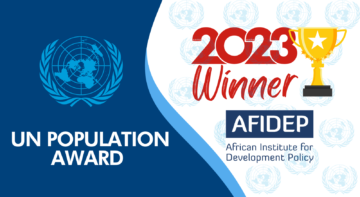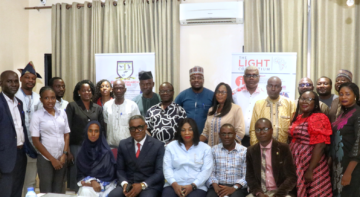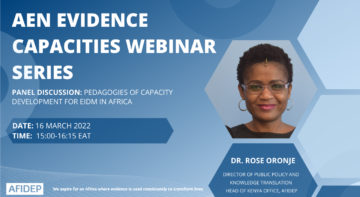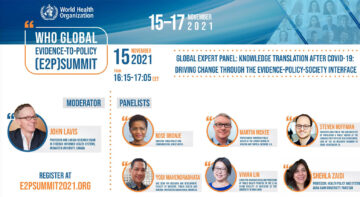Blogs

The Networks for Policy Engagement workshop, co-hosted by AFIDEP and the Malawi-Liverpool-Wellcome Trust Clinical Research Centre (MLW), marked an exciting two days of sharing passion for, lessons on, and commitment to the field of evidence-informed decision-making (EIDM). Taking place in Lilongwe, Malawi 25-27 February, the workshop brought together a dynamic, multidisciplinary group of research and policy experts from across Africa and Asia. Strategically, the workshop also served to inform Wellcome Trust, an emerging EIDM donor, of how they can address challenges and fill existing gaps in the EIDM field.
As a relatively new field, EIDM suffers from a lack of documented success [and failure]. This is due, in part, to the difficulty of evaluating the impact of policy engagement and EIDM. As participants noted, the policy-making process is a complex one, taking into account countless inputs, of which evidence is only one. Without the ability to disentangle policy from the politics it operates within, identifying causation and measuring impact of evidence in a realistic timeline are therefore really hard. Although delegates agreed upon the need for robust monitoring and evaluation of policy engagement and EIDM, they recognised that the best and quickest way to know if your work is effective is if you « keep getting invited back. » And the best and most compelling way to share such experiences and impact is through stories (like this one). From Wellcome’s perspective, Dr. Anna Ruddock, the Global Health Policy Advisor, later emphasised the need to share with donors the great success stories as well as the big failures. As a network and entire field, we cannot learn from our mistakes if we never talk about them.
Furthermore, as a field, EIDM must go beyond being evaluated by the mere existence of policies or decisions that are informed by evidence to actually measure their implementation. Policies are not ends in and of themselves. Rather, they are means to an end. And for policies to have their intended effects, they must be implemented effectively. Implementation was marked as a major challenge throughout the workshop, but most poignantly by Honorable Member of Malawi Parliament, Juliana Lunguzi, who noted that Malawi has many policies, but « implementation is the problem. » With implementation science and policy evaluation as hot-emerging fields, they are critical spaces for EIDM expansion. And as many actors now work to bridge the gap between research and policy, focus is needed to bridge the policy to practice gap.
Throughout the workshop, participants noted the lack of relevant and excellent research and evidence as a major challenge in EIDM. This stems from the fact that historically, most research in low and middle-income countries is externally funded, conducted and dictated. With limited resources, governments rarely prioritise locally-funded research, resulting in most research being externally-funded and often not responsive to priorities of governments. To address this challenge, participants emphasised the need for and value in co-production of knowledge, while advocating for nationally-funded research. One potential method of advocating for government-funded research was presented by AFIDEP’s Executive Director, Dr Eliya Zulu. Dr Zulu challenged the group to think of how the public can be mobilised to value evidence so that they pressure the government to put more resources into research and evidence.
It was during the last session of the workshop, a panel on Bringing Public Voices in Policy Engagement, that the power of the workshop and networks were made perfectly clear. Honorable Juliana Lunguzi called out the various critical gaps in policy engagement and EIDM »minimal public engagement, dependency on donors, uncoordinated stakeholders, and poor policy implementation. However, following such critiques, Honorable Juliana provided words of encouragement and reassurance– that she has seen the value of EIDM, that she wants to use evidence, and that addressing all of the current gaps is possible.
Ultimately, the challenges which policy engagement and EIDM currently face cannot be solved overnight or by fragmented actors. Rather, sustained, inclusive and determined networks are needed. And platforms which facilitate critical reflection and sharing of experiences »like the workshop »are fundamental to responsive and impactful efforts. Reflecting on the value of the workshop, Prof Nyovani Madise, AFIDEP’s Director of Research and Development Policy and Head of Malawi Office, notes « hearing the passion that people have for policy engagement »¦and to see the value that they [excellent research organisations] have put on policy engagement is really encouraging. » Despite the current challenges which EIDM champions face, the workshop reassured the network of the remarkable value in and potential for EIDM to transform lives for the better.
Related Posts





